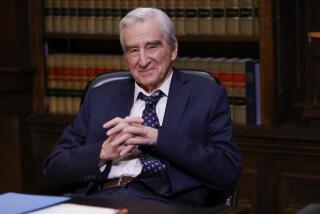Denny and Alan are ‘Legal’ at last
- Share via
After last week’s revelation that Denny Crane’s Alzheimer’s was getting worse, it seemed inevitable that Monday night’s series finale of “Boston Legal” would wind up with best friend Alan Shore either finally killing him or kissing him.
Instead, they split the difference and got married.
It was a fitting end to the most devoted, and deranged, couple on television.
Since the show’s spinoff from “The Practice” five years ago, the friendship between Denny (William Shatner) and Alan (James Spader), both pathologically heterosexual, has been both the anchor and the pixie dust of David E. Kelley’s award-winning show. No matter how wacky things got at Crane, Poole & Schmidt, each episode ended with the two men out on the balcony, smoking cigars, drinking scotch and talking about the vagaries of the human condition. In his unabashed attempt to explore male emotional intimacy, Kelley launched a thousand knockoffs, now known, most unfortunately, as “bromances.” But none holds a candle to the boys of “Boston Legal.”
So what if Alan took Denny to be his lawful wedded mostly to avoid tax laws and to ensure power of attorney? He loves the guy, as he managed to say at least 10 times in the course of two hours. Denny and Alan, together forever, baby whatever.
Kelley has never been afraid to use his shows to share his thoughts, politics and peeves -- the unappreciated-network-orphan leitmotif of “Boston Legal” continued through the finale, with Denny and Alan suggesting they get their own show, although it would have to be “on a new network. One that cares.”
On his soapbox
Since the series’ end marks the first time in almost 20 years that Kelley hasn’t been in prime time, it’s not surprising that he wanted to jam in a few more thoughts.
Such as:
China -- he’s against it. Or at least the insidious takeover of the United States by same under the guise of Chinese corporations, like the one that buys Crane, Poole & Schmidt. Shirley Schmidt (Candice Bergen) tried to stop the sale with an injunction, Denny shot the new bosses with paintballs and Alan threatened to sue them for wrongful termination. Still, it’s Chang, Poole & Schmidt as evening falls over Boston.
Religion -- not to be confused with spirituality and still against it. A ridiculous exchange between the priest and rabbi at the rehearsal for Shirley and Carl Sack’s (John Larroquette) wedding careened from the kidnapping of Christmas (You can’t even say the word anymore!) to the obsolescence of Israel before, rather unforgivably, winding up with that pat little speech about how religion does more harm than good (all those wars).
Pharmaceutical companies -- against them. When Alan and Denny go to the Supreme Court to argue that Denny should be allowed to take untested drugs in the hopes of stalling his Alzheimer’s, opposing counsel insists that if the pharmaceutical companies are given the least encouragement to dump untested drugs on the market, they will do so. Even Alan agrees.
The Supreme Court -- against it. Before pleading for the court’s mercy, Alan offers a nice little takedown of their anti-little-guy, pro-big corporation track record.
Gay marriage -- for it, only please call it same-sex marriage. As Alan argues, if every marriage were based on sexual desire, the institution would have failed long ago.
Extra eccentric
It was a lot of insanity and speechifying to wedge into a strange yet occasionally moving two hours. But then that is what “Boston Legal” has been about from the start -- civics for crackpots.
For five seasons, it has tried to address adult topics in full paragraphs in the only way possible given television’s current devotion to outrageousness -- with characters so odd they defied gravity. (With his tie-flipping, teeth-grinding, jaw-adjusting ways, Spader’s Alan was so tic-driven he often seemed in danger of bursting through not just the fourth wall, but the entire set.)
But it’s hard to fight the Industry’s slavish devotion to heat and its seemingly suicidal addiction to novelty. As best they could, the folks of “Boston Legal” refused to play, positioning the series instead as the eccentric yet endearing professor in the back of the room, the one who still sings Tom Lehrer in the shower.
Last week, the show addressed its legacy head on, with Carl launching a suit against the networks, claiming that their dimwitted devotion to young people amounted to ageism and bad business sense, because people over 50 went to more movies, watched more television and bought more CDs than the alleged youth market. “Yet the only show in which the leads are over 50 is ‘Bo--” Then Larroquette addressed the camera. “But that would break that wall.”
It was an AARP moment but also very true. And “Boston Legal” has broken that wall, and many other things, often, in its five seasons.
Yet for all its iconoclastic tendencies, its final episode bowed, albeit laughingly, to tradition. Alan won his case, Denny got his drugs, Shirley and Carl made up, and they all got married at a Canadian fishing lodge.
The final shot was of Denny and Alan dancing. Absurd, and yet, to paraphrase Emma Goldman, If you can’t dance, what’s the point of revolution?
--
More to Read
The complete guide to home viewing
Get Screen Gab for everything about the TV shows and streaming movies everyone’s talking about.
You may occasionally receive promotional content from the Los Angeles Times.







